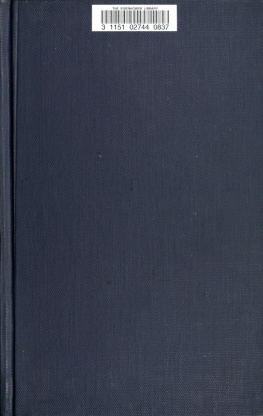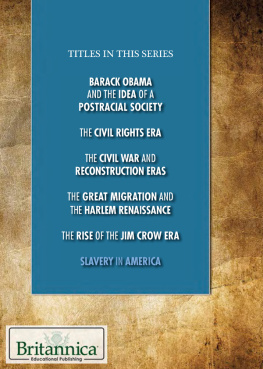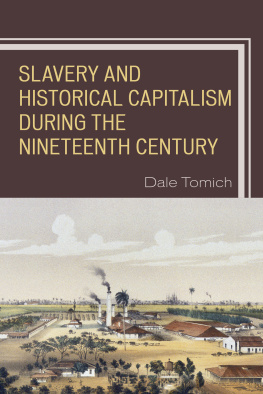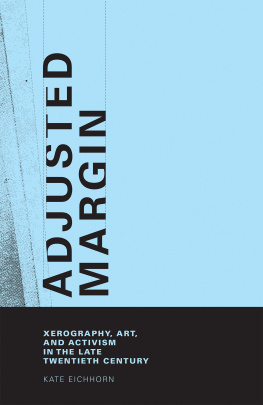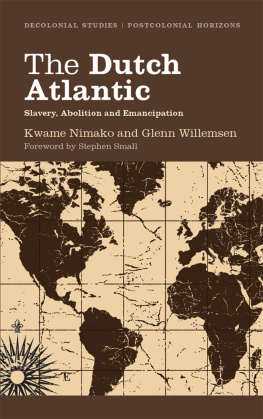LIBERTY and SLAVERY
CONFLICTING WORLDS
New Dimensions of the American Civil War
T. Michael Parrish, Series Editor
LIBERTY
AND
SLAVERY
EUROPEAN SEPARATISTS, SOUTHERN SECESSION,
AND THE AMERICAN CIVIL WAR
NIELS EICHHORN
LOUISIANA STATE UNIVERSITY PRESS
BATON ROUGE
Published by Louisiana State University Press
Copyright 2019 by Louisiana State University Press
All rights reserved
Manufactured in the United States of America
First printing
Designer: Barbara Neely Bourgoyne
Typeface: Ingeborg
Printer and binder: LSI
Library of Congress Cataloging-in-Publication Data
Names: Eichhorn, Niels, 1984author.
Title: Liberty and slavery : European separatists, southern secession, and the American Civil War / Niels Eichhorn.
Description: Baton Rouge : Louisiana State University Press, [2019] | Series: Conflicting worlds : new dimensions of the American Civil War | Includes bibliographical references and index.
Identifiers: LCCN 2019005203 | ISBN 978-0-8071-7167-7 (cloth : alk. paper) | ISBN 978-0-8071-7181-3 (pdf) | ISBN 978-0-8071-7182-0 (epub)
Subjects: LCSH: Separatist movementsHistory19th century. | EuropeHistoryAutonomy and independence movements. | SecessionSouthern States. | FortyEighters (American immigrants) | United StatesHistoryCivil War, 18611865Participation, Foreign. | United StatesHistoryCivil War, 18611865Causes. | LibertyHistory19th century. | Antislavery movementsHistory19th century. | EuropeEmigration and immigrationHistory19th century. | United StatesEmigration and immigrationHistory19th century.
Classification: LCC D359.7 .E53 2019 | DDC 973.7/13dc23
The paper in this book meets the guidelines for permanence and durability of the Committee on Production Guidelines for Book Longevity of the Council on Library Resources.

To Stephanie
CONTENTS
ACKNOWLEDGMENTS
Liberty and Slavery had a long and at times crooked route to navigate. I hardly imagined becoming a Civil War historian when I first got a peek at the conflict, in the late 1990s, watching the movie Gettysburg at home in Germany. While I got interested, many people along the way helped steer me away from the military and toward the transnational aspects of the war.
Much of my thanks belongs to Terry Beckenbaugh and Judy Gentry, who took an interested ESOL student under their wings. Terry got me interested in the relations between the German states and the United States during the Civil War, where I discovered Rudolph Schleiden, a figure that greatly intrigued me. I only later discovered that we both are from the same region and that I was in part doing a local history of my home region by studying him. During Terrys brief mentorship, I had not yet asked how a revolutionary from 1848 translated his experiences into the Civil War era. Judy humored my interest in the diplomatic side of the Civil War, dramatically advanced my understanding of the subject, and pushed me as a writer and historian. I am extremely thankful to have had these two wonderful teachers in my early career.
However, much of the credit for the transnational nature of Liberty and Slavery goes to Dan Sutherland and Laurence Hare. Dans mentorship and Laurences intellectual challenges dramatically transformed what I had envisioned as a study chronicling Schleidens life into a project that looked at a few individuals from the Schleswig-Holstein uprising of 1848 as they translated their revolutionary experiences into the sectionally torn United States. The interlibrary loan staff at the University of Arkansas was just amazing in obtaining all my requests for rare, old German publications, which they at times got from as far away as Denmark. However, I have to especially thank Dan for his patience.
Although the subject was interesting as a project, I quickly determined to make major changes and to expand my focus beyond Schleswig-Holstein and look at other secessionist movements. Again the interlibrary loan staff, both at the University of Arkansas and at Middle Georgia State College (later University), were extremely helpful in obtaining rare works on Irish, Polish, and Hungarian history. My editor at LSU Press, Mike Parrish, was always a great help when I had questions about structure or direction. It has been a great pleasure working with LSU Press on this project.
I also wish to thank the staff at the Schleswig-Holsteinische Landesbibliothek in Kiel, the Staatsarchiv Bremen, and the library at the Christian Albrecht Universitt in Kiel. They were extremely helpful in working with my often limited amount of time and the vast pile of documents I wished to consult. The secretary in Bremen, especially, was extremely helpful in making sure that I could take along, in person, as many copies as possible, to cut down on mailing costs.
At the same time, my many friends and colleagues deserve thanks for their support and conversations at conferences, especially Bob May, Paul Quigley, Brian Schoen, Pat Kelly, Duncan Campbell, Phil Myers, and David Schieffler. Of great help was the Virginia Sesquicentennial conference at George Mason and the Forty-Eighter conference at Wartburg College, where I presented on and got some good feedback for this project. Special thanks goes to Enrico Dal Lago and Daniel Nagel, who read the entire manuscript and provided extremely helpful feedback to strengthen the work.
However, my greatest thanks goes to my family. My mother, who was torn from us too early by cancer, in August 2017, supported the crazy history undertaking of her son financially and morally in its early stages, both during research trips in Germany and at my U.S. universities. Even more, my wonderful wife, Steph, and the many furries she brought into our lives, by choice or accidentally, and who frequently reminded me of having to take breaks, have been incredibly important to keep me going to complete this project. It is to my love that Liberty and Slavery is dedicated.
LIBERTY and SLAVERY
INTRODUCTION
The Separatist Atlantic World
A single section governed by the will of the numerical majority, has now, in fact, the control of the Government and the entire powers of the system. What was once a constitutional federal republic, is now converted, in reality, into one as absolute as that of the Autocrat of Russia, and as despotic in its tendency as any absolute government that ever existed.
JOHN C. CALHOUN, The Papers of John C. Calhoun
On October 26, 1863, the Hungarian refugee Emeric Szabad, serving with the Third Corps of the Union Army of the Potomac, left camp for a reconnaissance ride along the Rappahannock River in northern Virginia. As Szabads horse trotted through the night, he had an unfortunate encounter with Confederate pickets. While his companion escaped, Szabad did not. A Confederate officer questioned the Hungarian.
On being asked what state I belonged to, I replied, Hungary, Szabad confessed in his diary. This word filled my captain with a sort of astonishment; he found it incomprehensible, how a Hungarian could fight with the dd Yankees against the Southern people who were fighting for what Hungarians had fought for in 1848. Szabad explained, I came to America to fight for the Union, the destruction of which would cause joy to none but tyrants and despots. To Szabad, the inquiry by the Confederate officer had a straightforward answer.
Historians have not adequately asked the Confederates question when dealing with European separatist migrants. After all, the Civil War was only the latest iteration of a series of conflicts between nationalities in 1830 and 1848 to bring about independence from enslavement and oppression. If European migrants had feared enslavement in Europe, they frequently interpreted the southern defense of constitutional rights as originating from an aristocratic minority intent on forcing its will on the country as a whole. Others identified the southern desire for self-determination in the face of an oppressive, imperial Union with their own separatist struggle in Europe. Their separatist background and the way in which they interpreted the sectional struggle influenced the decision of European separatist migrants from the failed 1830 and 1848 uprisings to side with either the Union or the Confederacy.


